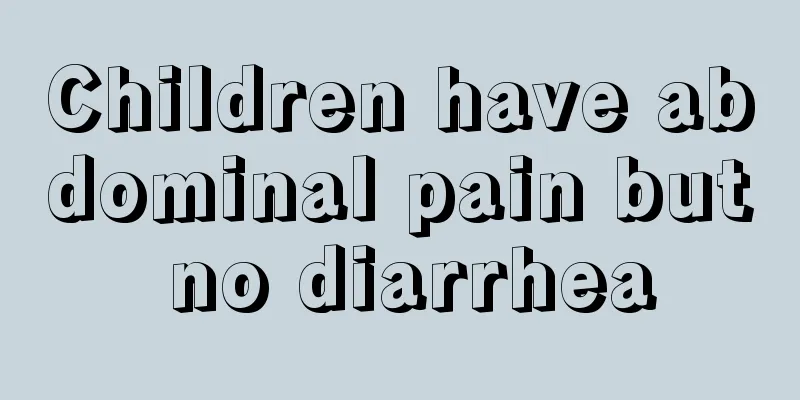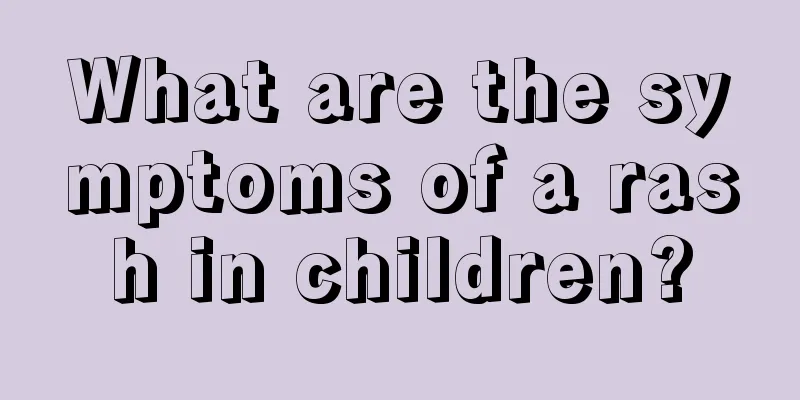Children have abdominal pain but no diarrhea

|
Many times, children will cry incessantly because of stomachache. The mothers thought that they had upset their stomachs due to eating something, but they found that apart from the abdominal cramps, they did not have diarrhea. What is going on? In fact, this situation is most likely caused by intestinal spasm, or abdominal pain caused by diseases such as acute gastroenteritis. Mothers also need to pay attention to this. The initial diagnosis of the child was: intestinal spasm. What is intestinal spasm? Intestinal spasm is paroxysmal abdominal pain caused by strong contraction of the intestinal wall smooth muscle. To make a simple comparison, if a child gets tired from running, he or she will get leg cramps, which is caused by excessive exercise of the calf muscles leading to muscle spasms. The intestinal wall is also composed of muscle tissue. Intestinal spasm is caused by improper eating, overload of food, excessive gastrointestinal workload, which causes spasm of the intestinal wall muscles and causes abdominal pain. Why are intestinal cramps more likely to occur in the summer? In the summer, children sweat a lot, consume more energy, and have relatively weak gastrointestinal function. On the other hand, the gastrointestinal burden increases: in summer, we eat more raw and cold food, eat more often outside, and eat more. Therefore, summer is a period when intestinal diseases are prone to occur, such as abdominal pain (caused by intestinal spasm), vomiting, and diarrhea. The main cause of intestinal spasm is improper diet: consuming more raw and cold foods such as ice cream and ice water, high-fat foods such as chicken wings and French fries, or eating significantly more than usual can often cause intestinal spasm and abdominal pain. Characteristics and treatment of intestinal spasm: Abdominal pain caused by intestinal spasm often manifests as sudden paroxysmal and intermittent abdominal pain, which is mainly around the navel, but it is also difficult to tell where the pain is specifically. Generally the pain is not severe, and children are willing to let their parents massage their stomachs, but there are also cases where the pain is quite severe. Intestinal spasms generally do not require special treatment, and adjusting diet is the most important thing. The intake of raw, cold and oily foods must be controlled. When the baby is in pain, you can give him a clockwise abdominal massage. Drinking hot water and applying hot compresses can also help relieve the pain. However, this disease is prone to recurrence, and attacks are often related to improper eating. Parents often worry that their children's recurring abdominal pain may be caused by intestinal parasites. Parasitic diseases are rare nowadays, and everyone pays great attention to hygiene and has good hand-washing habits, so this possibility is unlikely. If you have pets at home that may have zoonotic parasites, you can collect their stool and check for eggs. Not all abdominal pain is intestinal spasm. Of course, not all abdominal pain is intestinal spasm. If the abdominal pain is severe, massage does not relieve it significantly, or the pain gradually worsens, it is necessary to identify: Acute gastroenteritis: It can occur in children of all age groups. In addition to abdominal pain, there are often symptoms such as vomiting, diarrhea and fever. Intussusception: It is common in young infants. Typical clinical manifestations include paroxysmal crying, vomiting, sausage-like mass in the abdomen, and jam-like (bloody) stools. Spasm of the intussuscepted intestine causes abdominal pain and crying, which is often much more severe than simple intestinal spasm. Acute appendicitis: It mostly occurs in children over 5 years old, but infants and young children can also get the disease. The typical symptoms of appendicitis are migratory right lower abdominal pain, vomiting, and fever. Helicobacter pylori infection (HP): Helicobacter pylori infection is relatively rare in children, but if there is such a patient in the family and they eat together, if the child has repeated abdominal pain, the possibility of HP infection should be considered. You can go to the hospital for relevant examinations to clarify. |
<<: What should I do if my baby's anus is broken?
>>: The disadvantages of children learning badminton
Recommend
3-year-old baby with bronchitis and cough
Nowadays, more and more people are suffering from...
What causes blue birthmarks on babies? Mothers need to know
There are many things that have been there since ...
The dangers of having an IV in children
When it comes to indwelling needles, I think most...
Symptoms and treatment of myositis in children
Juvenile myositis refers to a disease that childr...
What medicine should children take for frequent urination
Nowadays, many parents find that their children a...
How to change infant formula
Nowadays, milk powder seems to have become a must...
What should I do if my baby has stomachache at night?
Many parents will encounter the situation that th...
How to improve children's memory
Every mother wants her child to learn more than o...
What are the common causes of hoarseness in children?
The importance of children to everyone is self-ev...
Why does my baby have a lot of tears and eye mucus?
Many parents will find that their babies have a l...
What are the causes of newborn skin peeling?
Newborns are the ones we need to focus on protect...
Why does my 4-year-old baby blink too much?
Nowadays, the vast majority of families in China ...
What to do if your baby is frightened and crying?
Some babies will cry when they are frightened, wh...
What to do if your child's head sweats while sleeping
It is a very common thing that children often swe...
Symptoms of otitis media in children
Otitis media is a very common ear disease, especi...









